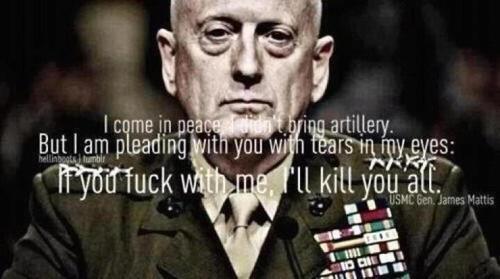M.B. Dallocchio's Blog, page 7
June 12, 2013
Quixote in Ramadi - Available on Kindle
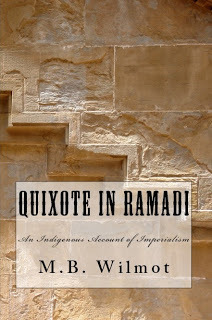 Click to BuyNow available! Purchase a copy of "Quixote in Ramadi: An Indigenous Account of Imperialism" here.
Click to BuyNow available! Purchase a copy of "Quixote in Ramadi: An Indigenous Account of Imperialism" here.“Quixote in Ramadi: An Indigenous Account of Imperialism” is a dark humor novel that is introspective and capricious, despite dealing with the serious issues of childhood abuse, neo-colonialism, homicide, genocide, and ethnic persecution. It tells the story of an indigenous female soldier in the US Army who deploys to Iraq at the height of the tension of the Fallujah massacre and the Abu Ghraib scandal, and faces unexpected catastrophes and corruption. While her command leadership frivolously spends defense funds in Baghdad's Green Zone and turns local Iraqis into personal servants, she is sent along with three other soldiers to one of the most dangerous cities in Iraq, Ar Ramadi. In Ar Ramadi, she faces direct combat while performing checkpoint operations, personnel searches and house raids with Marine infantry units in addition to losing friends, earning the trust of locals, and responding to military suicides and homicides in the region. This takes place all while her command severs their supplies, escalates persecution of minorities in the company, and launders thousands of dollars in defense funds intended for equipment and radios for those in austere regions like Ar Ramadi. This unit, ironically, is an Army mental health company. A Jewish officer and the indigenous soldier fight the command and are threatened with imprisonment. Although they faced brazen retaliation, they refused to be terrorized into submission. The soldier confides in her predominantly male Marine counterparts of the abuse taking place, who then encourage her to take matters into her own hands. The soldier is forced to confront the powers that be and finds herself facing the same trials as her ancestors. She fights to prevent the same history from repeating itself in Iraq. Throughout “Quixote in Ramadi,” flashbacks to child abuse, racial inequality, and family history are tied in to reveal myriad social and racial injustices that still exist in the United States.
Published on June 12, 2013 13:06
June 5, 2013
New Release: Quixote in Ramadi
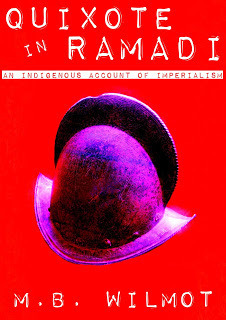
"Quixote in Ramadi: An Indigenous Account of Imperialism"
Coming June 2013! Live link to purchase the book will be available soon!
“Quixote in Ramadi: An Indigenous Account of Imperialism” is a dark humor novel that is introspective and witty, despite dealing with the serious issues of childhood abuse, neo-colonialism, homicide, genocide, and ethnic persecution. It tells the story of an indigenous female soldier in the US Army who deploys to Iraq at the height of the tension of the Fallujah massacre and the Abu Ghraib scandal, and faces unexpected catastrophes and corruption. While her command leadership frivolously spends defense funds in Baghdad's Green Zone and turns local Iraqis into personal servants, she is sent along with three other soldiers to one of the most dangerous cities in 2004, Ar Ramadi.
In Ar Ramadi, she faces direct combat while performing checkpoint operations, personnel searches and house raids with Marine infantry units in addition to losing friends, earning the trust of locals, and responding to military suicides and homicides in the region. This takes place all while her command severs their supplies, escalates persecution of minorities in the company, and launders thousands of dollars in defense funds intended for equipment and radios for those in austere regions like Ar Ramadi. This unit, ironically, is an Army mental health company. A Jewish officer and the indigenous soldier fight the command and are threatened with imprisonment.
Although they faced brazen retaliation, they refused to be terrorized into submission. The soldier confides in her predominantly male Marine counterparts of the abuse taking place, who then encourage her to take matters into her own hands. The soldier is forced to confront the powers that be and finds herself facing the same trials as her ancestors. She fights to prevent the same history from repeating itself in Iraq. Throughout “Quixote in Ramadi,” flashbacks to child abuse, racial inequality, and family history are tied in to reveal myriad social and racial injustices that still exist in the United States.
Published on June 05, 2013 12:28
April 12, 2013
The Art of Surviving Trauma
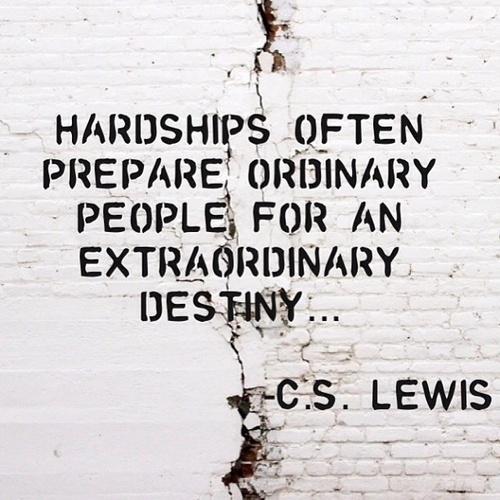
Translated from Italian at: http://signoradeifiltri.overblog.com/l-arte-di-sopravvivere-al-trauma
Art is a powerful instrument when it comes to communicating the aftermath of trauma, whether it’s physical or psychological. For me, it was combat. As a female combat veteran, it was especially difficult to make the transition back into the US after spending a year in one of Iraq’s most dangerous cities, Ar Ramadi, capital of the Al Anbar Province. Upon returning from a year of deaths, injuries, seeing some of the most glorious and hideous aspects of humankind in an uncensored montage, many judged me for what I had done (in their minds) without even asking me as well as insulted my experience using gender-related or racial remarks.
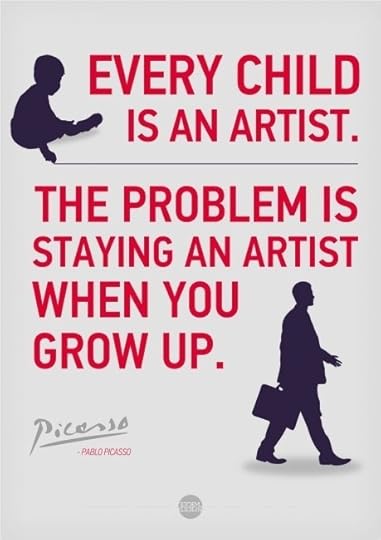 It was a tremendous amount of pressure. I was paying my way through university studies and working only part-time, and I was feeling as though I were dangerously nearing a breaking point. However, I was fortunate that I was aware of a personal pressure valve: Art.
It was a tremendous amount of pressure. I was paying my way through university studies and working only part-time, and I was feeling as though I were dangerously nearing a breaking point. However, I was fortunate that I was aware of a personal pressure valve: Art.Since I was a child, drawing, writing, painting, and even sculpting were my passions. Growing up hearing that artists never make enough money to live on, I attempted to pursue a degree in psychology. Unfortunately, I did not have the money to attend college, as it tends to be expensive here in the US, so I joined the Army, which promised me thousands to pay for school. They did not, of course, explain to me how I’d be working 60 hours a week while trying to accomplish my educational objectives. By the time I received orders for Iraq, I was halfway through college and upon my return, I changed my major from psychology to political science/international relations. After all, how can one make a difference in Middle Eastern policy when many of our elected officials – like most Americans – have never left the country? I have, 22 times and counting. I was a force to be reckoned with in foreign policy debates throughout my upper-level courses, but inside, I was empty.
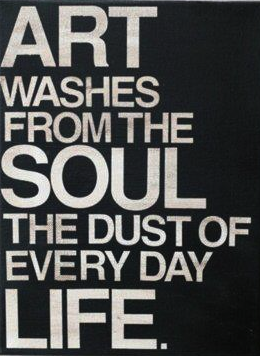 After some thorough introspection, I decided to paint again. After such a gruesome experience, I had lost my interest in art, as I did all other passions and dreams. I felt numb, but I knew art always had a way of unlocking a door into new ideas and plans. Even if I didn't want to, I painted, wrote, sketched, and even took part in Middle Eastern dance as a hobby and side gig. Slowly, I felt warmth return to my veins via creativity. Art was making a transfusion.
After some thorough introspection, I decided to paint again. After such a gruesome experience, I had lost my interest in art, as I did all other passions and dreams. I felt numb, but I knew art always had a way of unlocking a door into new ideas and plans. Even if I didn't want to, I painted, wrote, sketched, and even took part in Middle Eastern dance as a hobby and side gig. Slowly, I felt warmth return to my veins via creativity. Art was making a transfusion."Any (wo)man who is really an artist," wrote journalist Charles Lummis in 1892, "will find the Southwest...a region where the ingenuity of life, the imagination and the love of God are...visible at every turn."
Eventually, I followed my dream of moving to the Southwestern US, Arizona and Nevada, where my artistic talents truly blossomed. Before I knew it, I was creating depictions of the most painful memories, which reignited a state of insomnia but launched into a new level of artistic fervor. Then my art turned from wartime trauma to politics, which have been laced with both humorous satire as well as sharp criticism.
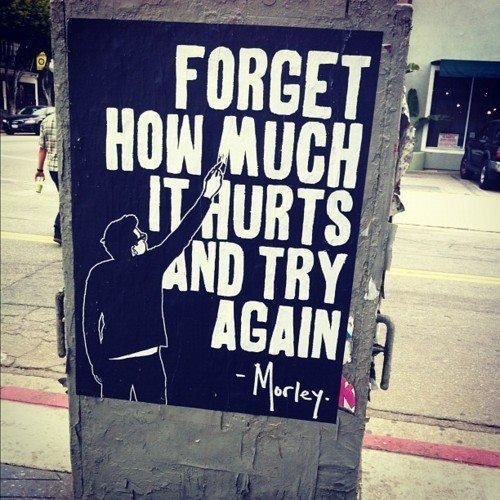 With military veteran friends and former colleagues suffering from mental illness and turning to over-medicating practices provided by the Department of Veterans Affairs and Department of Defense, doling out a litany psychotropic medications and narcotic painkillers to anyone who asked and this bothered me. It wasn't natural. While I have stared into combat’s abyss, I can proudly say that I took the road less traveled. I followed my heart back to art where I could both express myself and ease my pain, venting my troubles through pens, paintbrushes, and clay and validating my experiences on my own terms with a finished masterpiece. Art truly saved my life.
With military veteran friends and former colleagues suffering from mental illness and turning to over-medicating practices provided by the Department of Veterans Affairs and Department of Defense, doling out a litany psychotropic medications and narcotic painkillers to anyone who asked and this bothered me. It wasn't natural. While I have stared into combat’s abyss, I can proudly say that I took the road less traveled. I followed my heart back to art where I could both express myself and ease my pain, venting my troubles through pens, paintbrushes, and clay and validating my experiences on my own terms with a finished masterpiece. Art truly saved my life. After working with other veterans as well as severely mentally ill clients and encouraging them to express themselves through artistic, literary, culinary, musical, and other creative means, I've seen the most dramatic, positive changes in well-being. Such transformations could not be done through prescriptions drugs or any other poisonous substances, which are designed to further numb the senses and keep one from embracing personal truths and ultimately discovering one’s own path to healing. I have, as a result, continued on this creative path, reclaiming my life one artistic step a time and finding my way out of a personal abyss by refusing to be a victim of trauma. Instead, I am an artist – who happens to be a survivor.
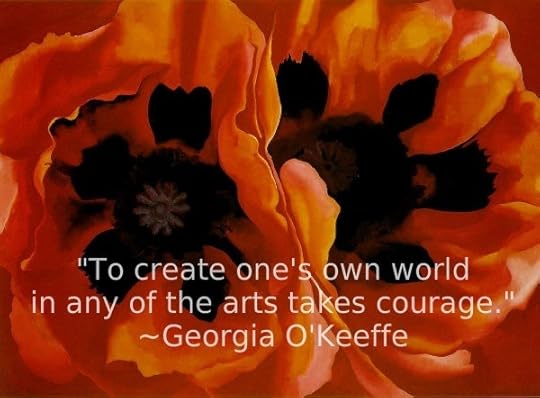 See my work at: www.thedesertwarrior.com
See my work at: www.thedesertwarrior.com
Published on April 12, 2013 10:06
April 10, 2013
How Valuable is Your Time?
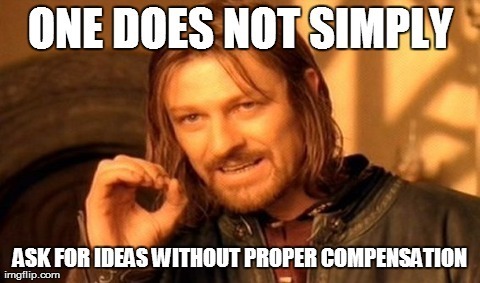
Picture this. Imagine that you're invited to an event in which your proposal for a new business or nonprofit is going to be filmed live on national television. You're presenting alongside other companies that have similar goals and aspirations, and in the end, you'll compete for a grant and the most popular choice wins. Before you walk up on stage to present your proposal, you're told that you're simply not allowed. No real reason, no explanations, just a vague "no" and immediate dismissal. You then watch everyone else gain the opportunity and there you are, sitting with your ideas in your hands and a presentation to share and you've just been barred from the stage for no reason. No thanks for your time. That'll be all.
This really happened to me. I was invited to an event that was hosted by a seemingly up-and-coming nonprofit in 2010. They paid for my flight and hotel room to come all the way out to Los Angeles - I was living outside of Boston at the time - and MTV would be filming my group in addition to a handful of other veterans competing for grant money for their respective or future veterans organization. This nonprofit, which was partnered with MTV, seemed impassioned by their desire to help veterans, to include a teary-eyed Executive Director sharing her story of a veteran in her family. She's wasn't a veteran, but the display of emotion was quite dramatic.
When it came to showtime, I noticed that the agenda completely threw out three minority female veterans, including me. We had ideas that weren't exactly controversial - or so we thought - regarding aiding homeless women veterans or those affected by domestic abuse to having an organization that would be an Angie's List for veterans in weeding out faulty resources and locating quality nonprofits and agencies. When I approached three different staff members, all feigned confusion. Everyone who was invited received specific instructions to provide a PowerPoint presentation along with any other media that they wished to share for the MTV filming. It was just three of us, one Asian American, one African American, and one Pacific Islander. The only other females presenting - just two others - were quite shy and soft-spoken, but were also white.
"I guess that's what they want to the world to see when they think of women veterans, and it's not us," said one of the other shunned female veterans.
We all came to the same conclusion after getting stonewalled by this nonprofit and in the end it came down to one employee who simply didn't want us to present. No reason surfaced, just a scowl and some milquetoast shrugs by her associates. I was furious. The other teams of mostly male or all-male groups were motivated and empowered. They had a voice and they were given the opportunity. The three of us were silenced and our opportunity was revoked during live TV, except no one watching at home knew what was going on behind the scenes.
The evening prior to this humiliation, the teary-eyed Executive Director touting her military family story ended up wining and dining one of the male veteran contestants, from an established veterans organization, and sleeping with him. Surprise, his group got funding and air time as well.
Upon leaving, one of the fellow veterans from the event who held a significant position with a veterans organization who was dropping me off at LAX, a former Army Ranger, asked if he could give me a hug before I walked through the gate. I agreed, no harm in that. Veterans hug, so what? Yet he took that hug to another level. He grabbed me by the *ss and lifted me mid-air and exclaimed, "That's such a f***ing great *ss!"

Then he turned around and bolted. I stood there baffled, disgusted. Needless to say my impression of this event made me feel exploited on a whole other level. They paid for my flight and room, sure. But they made absolute sure that I felt like I not only didn't belong, but that I got an extra slap in the face before returning home. What a way to promote veteran reintegration. "Welcome back troops - Wait, not so fast, naturally-tanned, ethnic female. GFY."
But here's the funny part. Even after continuing to show support for some of these fellow organizations, I noticed that in spite of them knowing how the three of us were unfairly cast aside, they certainly were doing nothing to speak out for us on all that had transpired. One organization, knowing my Team Lioness background and medical skills, asked me to be part of their volunteer team. When I signed up as requested and e-mailed my resume, I got a quick and curt reply that I simply wasn't welcome. This was the same team that got first place at the LA event.
One male veteran that we met at this event, however, has been a great point of contact, works directly with disadvantaged veterans in Southern California, and is truly an unsung hero. Although he is not a self-appointed Executive Director/CEO/Founder/Owner/etc. of any organization, he has remained a friend throughout to all of us. He, too, seemed to be perplexed by what happened and asked around for feedback. Yet much of what happened had been apparently shrugged off by others.
Additionally, after facing quite a disturbing event, I noticed these items following the trip:
1. I was getting asked by established organizations met at events like this or elsewhere to "give advice" and design programs without any compensation.
2. My idea - funny coincidence - soon after the LA event turned into an organization that I have no part of at all.
3. After speaking out about a few shady veterans organizations, I've been solicited by male veteran contacts - this happened just last year - for nude photos.
Call it Oliver Stone-esque paranoia. Call it a low down dirty shame on them. Call it whatever you will. When the short-lived party of self-pity ended, I came to this conclusion: I'm charging for my time. My ideas were being solicited and used, and no compensation followed for my time, work, or input. Forget about how much it hurts when you've been used. It's one thing when an organization flies you out somewhere and screws you, it's another when they try to screw you for free. Both are entirely absurd and degrading, but no one is going to treat me like pro bono prostitute. I've noticed a few others in the veterans advocacy community facing this dilemma. They were getting solicited for ideas to make stellar profits and provided no compensation or thanks in return.
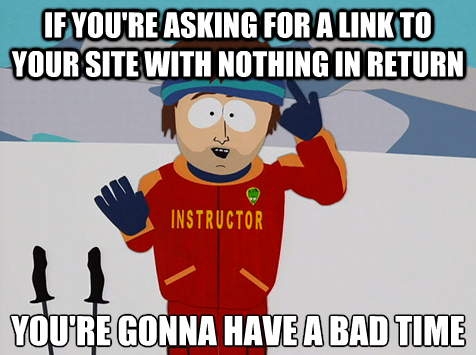
The bottom line: When you have great ideas and others are either muting your voice and/or ripping off your talents, intellectual property, and insight in effort to pocket cash, look into starting your own consulting business. Start your own organization. Do your own advertising. Continue on your own path. No one can speak up for you like you can. And in the end, despite the insult and injury, I finally allowed that negative energy to be converted into something useful. Writing my own pieces. Promoting my artwork. And playing stupid and stonewalling those who seek to take and offer nothing in return.
Value your time, even if others seem like they don't. And charge while you're at it. If you don't value your time, others will take notice and they will be glad to take your assets without paying.
Published on April 10, 2013 17:07
March 28, 2013
General Mattis
Published on March 28, 2013 11:11
March 20, 2013
Defining Pacific Islander as an Islander - PART I

After reading the article, "4 Myths About Pacific Islanders BUSTED" I must say that the majority of the article was on-point with the exception of this strand:
However, there are those who argue that the Philippines have more historical and genetic kinship with other Pacific Islanders than Asians and that Filipinos thus should be classified as Pacific Islanders.
There are plenty of reasons Filipinos are defined as Asian. They are Asian.
Pacific Islanders finally have a voice in determining who they are, and the Census Bureau actually took our voices, culture, language, and history into account - not letting another larger group - Asians - define us. And Filipinos, while ethnically diverse like many former European colonies, are without a doubt Asian, indigenous to Asia. There is a cultural and ethnic gap there and it's not debatable based on which ethnic group seems more fashionable at the moment.
Here's the real definition of a Pacific Islander by Pacific Islanders:
POLYNESIA The islands scattered across a triangle covering the east-central region of the Pacific Ocean. The triangle is bounded by the Hawaiian islands in the north, New Zealand in the west, and Easter Island in the east. The rest of Polynesia comprises Samoa (American Samoa and Western Samoa), the Cook Islands, French Polynesia (Tahiti and The Society Islands, Marquesas Islands, Austral Islands, and the Tuamotu Archipelago), Niue Island, Tokelau and Tuvalu, Tonga, Wallis and Futuna, and Pitcairn Island.
MELANESIA The island of New Guinea, the Bismarck and Louisiade archipelagos, the Admiralty Islands, and Bougainville Island (which make up the independent state of Papua New Guinea), the Solomon Islands, the Santa Cruz Islands (part of the Solomon Islands), New Caledonia and Loyalty Islands, Vanuatu (formerly New Hebrides), Fiji, Norfolk Island, and various smaller islands.
MICRONESIA The islands of Kiribati, Guam, Nauru, the Commonwealth of the Northern Mariana Islands (CNMI), the Republic of the Marshall Islands, the Republic of Palau, and the Federated States of Micronesia (Chuuk, Kosrae, Pohnpei and Yap, all in the Caroline Islands).
As a Micronesian - and one can argue the Western construct of Asians as well regarding international boundaries - it's incredibly offensive that anyone would condone this brand of cultural hijacking. Micronesians, Melanesians, and Polynesians are groups that are not merely Western constructs, but are identified as such due to what Stacy Nguyen stated to be "very different culturally and ethnically."
Pacific Islanders have an additional problem aside from becoming swallowed up by larger groups or ridiculous stereotypes: our culture is being treated like a fad. Filipinos are, indeed, Asian. The Philippines doesn't even touch the Pacific Ocean. To the east of the country is the Philippine Sea, not the Pacific. So there we have basic geography covered.
When it comes to migration patterns, Pacific Islander history is chopped up, but like Native Americans, we left the continent of Asia thousands of years ago, while other regions in Southeast Asia and the continent as a whole had far more international contact with one another. And while many Asian groups have settled in various parts of Oceania, that doesn't make them anymore indigenous to the Pacific than a European settling on Navajo land in the US. Ever snicker at someone of European descent claiming to be a great grandchild of a "Cherokee princess?" Try listening to an Asian put a flower in their hair and call themselves Native Hawaiian simply because their parents own a condo in Waipahu. Yeah, it's that effing ridiculous.
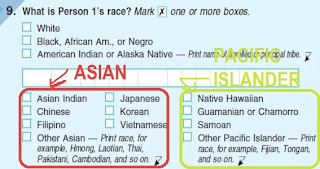
While many former colonized countries struggle to rediscover identity, calling oneself Pacific Islander without any factual grounds is not just absurd, it's incredibly insulting. My culture, ethnicity, heritage is not a trendy scarf to wear when it's convenient. As someone who is a Pacific Islander who is very well aware of my own identity, one should think about defining someone else's race for them when they have no authority to do so. Ahem, Stacy Nguyen.
In another post, I will delve further into why statistics are important to monitor when it comes to ethnicity in addition to citing more figures as to why this needs to be studied. This is not simply about being more sensitive or politically correct, it's about piecing together a puzzle of old problems resulting from colonialism and finding solutions through data collection and analysis. You can't resolve colonial illnesses correctly unless you've identified the symptoms and treat them accordingly - whether it's a dying language or high suicide and dropout rates. Ultimately, we can all hope that even in spite of irreparable damage to ancient civilizations, that we can move on and heal from centuries of dehumanization. However, we mustn't be deterred by others who are either bent on hijacking our culture or defining our identity for us.
Published on March 20, 2013 10:34
March 8, 2013
Female Combat Veteran Art @ The Act

Purchase tickets to my upcoming Las Vegas art show at The Act @ The Palazzo Hotel & Casino April 25, 2013! Tickets are only $15 and even if you can't make it, purchasing tickets will help tremendously for this event!
Click to purchase: http://www.rawartists.org/lasvegas/marvel/?artist=128662
Published on March 08, 2013 13:31

